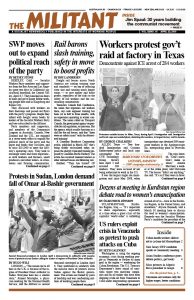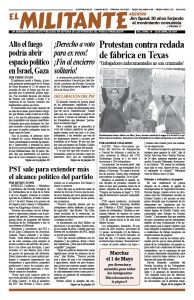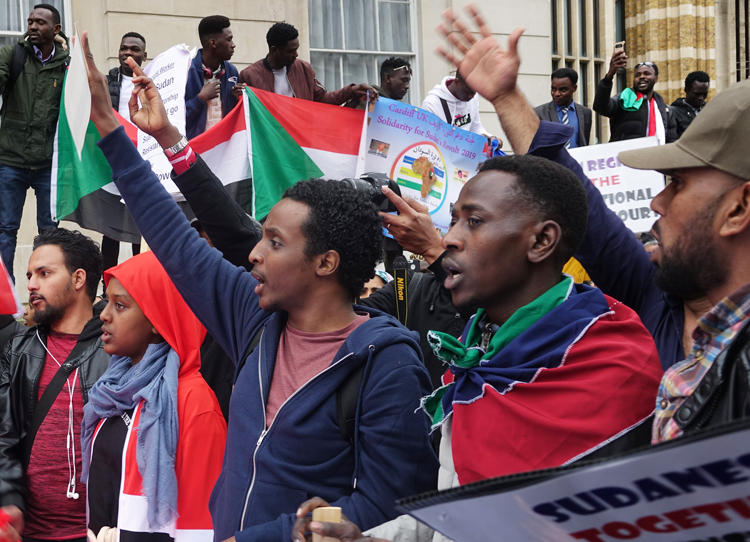LONDON —“The reason we’re all here in the U.K. is because of the regime of President Omar al-Bashir in Sudan. Everyone here has a similar story,” Ahmed Mustapha, a physician working for the National Health Service, told the Militant as several thousand converged in London April 6. They mobilized in solidarity with the massive wave of protests across Sudan against the Bashir government. The actions are fueled by years of hardship and war confronting millions of working people there.
“Just fall, that is all,” and “Freedom, justice, democracy” were among the main chants in both English and Arabic.
Buses from Glasgow, Cardiff, Newport, Nottingham, Birmingham, Wolverhampton and other cities and towns across the U.K. brought people to the protest outside the Sudanese Embassy. “We chose April 6 because it’s the anniversary of the 1985 uprising that toppled the regime of Jaafar al-Nimeiri, another dictator in Sudan,” many demonstrators said.
Around 200 people — five buses full, with this worker correspondent on board — came to the demonstration from Manchester. By going to London “the world can see our struggle,” Muzamil Musa, one of the organizers of the contingent from Manchester, told the Militant. “And London is the capital so we can do it in front of the U.K. government.” The British rulers had imposed their colonial rule over Sudan for over 50 years, ending in 1956.
The protests in Sudan began in opposition to Bashir’s decision to triple bread prices in mid-December. Inflation, felt most sharply by working people, hit 70% at the end of last year. “Last summer, 50 Sudanese pounds equaled 1 British pound, now it’s 100 pounds, but the salaries remain the same!” said Khalid Gaily, a petrol station worker in Droylsden, Tameside near Manchester.
“When I lived in Sudan, I used to work in the petroleum industry and my contract stated that I should earn $300 a month. But my employer paid me in Sudanese pounds instead! I ended up earning the equivalent of $250 a month after eight years of working there, because of inflation,” said Gaily.
Khartoum’s involvement in the civil war in Yemen is another source of anger against the regime. For nearly four years at least 14,000 Sudanese militiamen have been fighting in Yemen alongside Saudi-backed forces. “They take young people from poor families, promise them money if they go to Yemen, but they don’t properly tell them what they are going in for, what they will be doing,” said Yahya Khalafalla, a warehouse worker from north Manchester. “People talk about this and don’t like it.”
The protests have been marked by efforts to overcome the various divisions among toilers in Sudan. “We need unity from west to east and north to south in Sudan,” Musa pointed out, saying that people there are fighting to overcome divisions based on language, religion and national origin. These were fostered by the former British colonial rulers and perpetuated by the current government to bolster its rule.
Another prominent feature of the demonstrations is the mass participation of women. An estimated two-thirds of the people involved in the protests in Sudan are women, and there were many women at the London action.
The crowd in front of No. 10 Downing St., the U.K. prime minister’s residence, where the march ended, erupted in an explosion of joyous celebration when news reached them that protesters in Sudan had arrived at the headquarters of the Sudanese military in Khartoum without the army intervening.
Ali Ibrahim of the Sudanese Professionals Association, an organizer of the Khartoum protest, told EFE news agency that military units had fired into the air to prevent other security forces from dispersing the demonstrators.
On the bus ride home to Manchester, Musa said people were inspired by developments in Algeria. “Now that [Algerian President] Bouteflika was forced to resign, that will give the people in Sudan more confidence,” he said. Protesters in Sudan told the press the same thing.
“We will continue to demonstrate, even after Bashir has fallen,” said Elmutwakil Ibrahim, a petrol station worker near Stockport and law school graduate in Sudan, “because we’ll still need to win our political and democratic rights.”
Members of the Communist League from London and Manchester built and joined the protest. Talking with others in the crowd and from a literature table, they met a hunger for books by communist leaders in English and Arabic. Participants thronged our table, buying five Militant subscriptions and 60 books on revolutionary politics.


